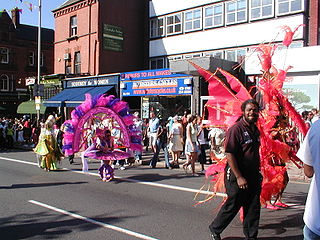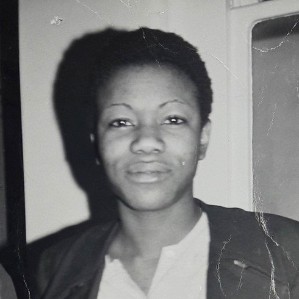Related Research Articles

British African-Caribbean people are an ethnic group in the United Kingdom. They are British citizens whose ancestry originates from the Caribbean or they are residents of the Caribbean who reside in the UK. There are some self-identified Afro-Caribbean people are multi-racial. The most common and traditional use of the term African-Caribbean community is in reference to groups of residents continuing aspects of Caribbean culture, customs and traditions in the UK.

Claudia Jones, néeClaudia Vera Cumberbatch, was a Trinidad and Tobago-born journalist and activist. As a child, she migrated with her family to the US, where she became a Communist political activist, feminist and black nationalist, adopting the name Jones as "self-protective disinformation". Due to the political persecution of Communists in the US, she was deported in 1955 and subsequently lived in the United Kingdom. Upon arriving in the UK, she immediately joined the Communist Party of Great Britain and would remain a member for the rest of her life. She then founded Britain's first major black newspaper, the West Indian Gazette, in 1958, and played a central role in founding the Notting Hill Carnival, the second-largest annual carnival in the world.
The Brixton Artists Collective was a group of artists based in Brixton, London, who ran the Brixton Art Gallery (BAG) from 1983 to 1990.

The Brixton murals are a series of murals by local artists in the Brixton area, in London. Most of the murals were funded by Lambeth London Borough Council and the Greater London Council after the Brixton riots in 1981.

Olive Elaine Morris was a Jamaican-born British-based community leader and activist in the feminist, black nationalist, and squatters' rights campaigns of the 1970s. At the age of 17, she was assaulted by Metropolitan Police officers following an incident involving a Nigerian diplomat in Brixton, South London. She joined the British Black Panthers, becoming a Marxist–Leninist communist and a radical feminist. She squatted buildings on Railton Road in Brixton; one hosted Sabarr Books and later became the 121 Centre, another was used as offices by the Race Today collective. Morris became a key organiser in the Black Women's Movement in the United Kingdom, co-founding the Brixton Black Women's Group and the Organisation of Women of African and Asian Descent in London. When she studied at the Victoria University of Manchester, her activism continued. She was involved in the Manchester Black Women's Co-operative and travelled to China with the Society for Anglo-Chinese Understanding.
Pearl Connor-Mogotsi, née Nunez, was a Trinidadian-born theatrical and literary agent, actress and cultural activist, who was a pioneering campaigner for the recognition and promotion of African Caribbean arts. In the UK, in the 1950s, she was the first agent to represent black and other minority ethnic actors, writers and film-makers, and during the early 1960s was instrumental in setting up one of Britain's first black theatre companies, the Negro Theatre Workshop. In the words of John La Rose, who delivered a eulogy at her funeral on 26 February 2005: "Pearl Connor-Mogotsi was pivotal in the effort to remake the landscape for innovation and for the inclusion of African, Caribbean and Asian artists in shaping a new vision of consciousness for art and society."
Ravinder Randhawa is a British Asian novelist and short story writer. She founded the Asian Women Writers' Collective, an organisation for British Asian women writers.
Ferdinand Dennis is a writer, broadcaster, journalist and lecturer, who is Jamaican by birth but at the age of eight moved to England, where his parents had migrated in the late 1950s. Dr James Procter notes: "Perhaps as a result of his Caribbean background, Dennis is a writer ultimately more concerned with routes than roots. This is foregrounded in much of his fictional work, notably his most recent and ambitious novel to date, Duppy Conqueror (1998), a novel which moves from 1930s Jamaica to postwar London and Liverpool, to Africa. Similarly, Dennis' non-fiction centres on journeying rather than arrival, from Behind the Frontlines: Journey into Afro-Britain (1988) to Voices of the Crossing: The Impact of Britain on Writers from Asia, the Caribbean and Africa (2000)."
John Lyons is a Trinidad-born poet, painter, illustrator, educator and curator. He has worked as a theatre designer, exhibition adviser and as a teacher both of visual art and creative writing. As an art critic, he has written essays for catalogues, notably for Denzil Forrester's major touring exhibition Dub Transition, for Jouvert Print Exhibition and Tony Phillips' Jazz and The Twentieth Century.
Rita Keegan is an American-born artist, lecturer and archivist, based in England since the late 1970s. She is a multi-media artist whose work uses video and digital technologies. Keegan is best known for her involvement with in the UK's Black Arts Movement in the 1980s and her work documenting artists of colour in Britain.
West Indian Gazette (WIG) was a newspaper founded in Brixton, London, England, by Trinidadian communist & black nationalist activist Claudia Jones (1915–1964) in March 1958. The title as displayed on its masthead was subsequently expanded to West Indian Gazette And Afro-Asian Caribbean News. WIG is widely considered to have been Britain's first major black newspaper. Jones, who originally worked on its development with Amy Ashwood Garvey, was its editor. WIG lasted until 1965, but always struggled financially, closing eight months and four editions after Claudia Jones's death.
Rukhsana Ahmad is a Pakistani writer of novels, short stories, poetry, plays, and a translator, who after marriage migrated to England for further studies and pursue a career in writing. She has campaigned for Asian writers, particularly women.
The mission statement of the South Asian Women's Creative Collective (SAWCC) states: "SAWCC has served South Asian women since 1997 and has earned a reputation for showcasing cutting-edge work that deals intelligently with issues of gender and cultural representation. It is a nonprofit arts organization dedicated to the advancement, visibility, and development of emerging and established South Asian women artists and creative professionals by providing a physical and virtual space to profile their creative and intellectual work across disciplines." SAWCC has no membership dues and is entirely volunteer-driven.
Quilombhoje is a literary group of Afro-Brazilian writers formed in the early 1980s. The word "Quilombhoje" is a portmanteau of the Portuguese words quilombo and hoje (today). It was part of a greater black identity movement internationally ubiquitous in the 20th century. Since its founding, Quilombhoje has hosted many literary and cultural activities which promote awareness of, and pride in, Afro-Brazilian heritage.
Black Ink Collective was a British publishing company founded in 1978 to publish the work of young Black writers in the UK.
Joan Anim-Addo is a Grenadian-born academic, poet, playwright and publisher, who is Emeritus Professor of Caribbean Literature and Culture in the English and Creative Writing Department at Goldsmiths, University of London.
The Other Story was an exhibition held from 29 November 1989 to 4 February 1990 at the Hayward Gallery in London. The exhibition brought together the art of "Asian, African and Caribbean artists in post war Britain", as indicated in the original title. It is celebrated as a landmark initiative for reflecting on the colonial legacy of Britain and for establishing the work of overlooked artists of African, Caribbean, and Asian ancestry. Curated by artist, writer, and editor Rasheed Araeen, The Other Story was a response to the "racism, inequality, and ignorance of other cultures" that was pervasive in the late-Thatcher Britain in the late 1980s. The legacy of the exhibition is significant in the museum field, as many of the artists are currently part of Tate's collections. The exhibition received more than 24,000 visitors and a version of the exhibition travelled to Wolverhampton Art Gallery, 10 March to 22 April 1990; and Manchester City Art Gallery and Cornerhouse, 5 May to 10 June 1990.

Brenda Patricia Agard was a Black-British photographer, artist, poet and storyteller who was most active in the 1980s, when she participated in some of the first art exhibitions organized by Black-British artists in the United Kingdom. Agard's work focused on creating "affirming images centred on the resilience of the Black woman," according to art historian Eddie Chambers.
Melodians Steel Orchestra UK is a band formed in South London in October 1987 by Terrance "Terry" Noel MBE, composed of orchestra members using the steelpan instrument. They have since achieved considerable success in their musical and community endeavours, being well-recognised by various UK Governmental organisations, the Diplomatic Service and NGOs such as PRS for Music. The band has since assumed a status of national importance to modern British culture and has become symbolic of the importance of the relationship between the UK and the Commonwealth, particularly Trinidad and Tobago.

SuAndi OBE is a British performance poet, writer and arts curator. Based in North West England, she is particularly acknowledged for raising the profile of black artists in the region as well as nationally. Since 1985 she has been Cultural Director of the National Black Arts Alliance. She was appointed an OBE in 1999 for her contributions to the Black Arts sector.
References
- ↑ Ranasinha, Ruvani (2016). "Redefining Britishness: British Asian Fiction". In Mary Eagleton; Emma Parker (eds.). The History of British Women's Writing, 1970–Present: Volume Ten. Springer. p. 172. ISBN 978-1-137-29481-4.
- 1 2 3 4 5 6 "Asian Women Writers' Collective" (PDF). South Asia Diaspora Arts Archive. Retrieved 5 December 2020.
- ↑ Sen, Asha. "Asian Women Writers' Workshop". In Alison Donnell (ed.). Companion to Contemporary Black British Culture. p. 20.
- ↑ Abram, Nicola L. (2020), "Forging connections: anthologies, artscollectives, and the politics of inclusion". In Susheila Nasta and Mark U. Stein (eds), The Cambridge History of Black and Asian British Writing. Cambridge: Cambridge University Press, pp. 403–416. doi: https://doi.org/10.1017/9781108164146.026.
- ↑ AAWC: administrative papers, corresp and manuscripts, also incl personal papers and corresp of individual members, The National Archives. Accessed 5 December 2020.
- ↑ SADAA: Asian Women Writers Collective (AWWC)